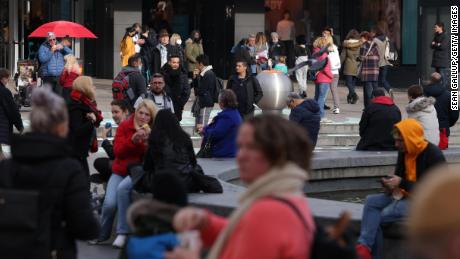Alexander Schallenberg told reporters the country’s vaccination rate was “shamefully low,” and hinted that the measure would be triggered within days. “In other states that rate is a lot higher — it is shameful as we have enough vaccines available,” Schallenberg added.
Under the country’s plan, which was agreed in September, unvaccinated Austrians will face a stay-at-home order once 30% of intensive-care beds are occupied by Covid-19 patients. The current rate is 21%, according to the Austrian Agency for Health and Food Safety (AGES), and a surge in infections has pushed it up quickly.
Unvaccinated people are already excluded from entertainment venues, restaurants, hairdressers and other parts of public life in Austria. If the new measures come into place, the unvaccinated will be ordered to stay home except for a few limited reasons; the rules will be policed by officers carrying out spot checks on those who are out.
Around 65% of Austria’s population is fully vaccinated against Covid-19, one of the lower rates in the European Union.
”It is clear that this winter will be uncomfortable for the unvaccinated,” Schallenberg warned, adding that ”the lockdown could come much faster than some might think.”
“A lockdown for the unvaccinated means one cannot leave one’s home unless one is going to work, shopping for essentials, stretching one’s legs — namely exactly what we all had to suffer through in 2020,” Schallenberg said.
After Schallenberg’s announcement, the governor of the province of Upper Austria, in the northwest of the country, said he planned to introduce a lockdown for the unvaccinated on Monday. It will be introduced “provided there is a legal green light from the federal government and/or it creates the legal basis for it,” governor Thomas Stelzer said in a statement to Reuters, labeling the situation in his region as “dramatic.”
Schallenberg’s tone encapsulated the frustration that several European governments have expressed towards unvaccinated pockets of society, as a wave of Covid-19 infections sweeps the region.
In neighboring Germany, ministers have ramped up their rhetoric towards those who are not inoculated. Its capital Berlin announced on Wednesday it will ban people who are not vaccinated from indoor dining, bars, gyms, hairdressers and cinemas from next week.
Vaccine rates vary across Europe but get steadily lower towards the east of the continent.
German officials meanwhile warned on Thursday the country remains in the grips of a ”very worrying” rise in Covid-19 cases and advised residents to “urgently to cancel or avoid larger events if possible, but also to reduce all other unnecessary contacts.”
According to the Robert Koch Institute, the country’s seven-day incidence rate has risen to 263.7 cases per 100,000 people — up from 169.9 cases reported a week ago.
Authorities in the country’s wealthiest state, Bavaria, declared a state of emergency on Thursday. ”The coronavirus pandemic threatens the lives and health of a large number of people throughout the state of Bavaria,” a statement published by the state premier’s office on Wednesday said, adding that ”in many hospitals, there are already no or only very few capacities available.”
For the second consecutive week, Europe was the only region in the world where cases and deaths were found to be climbing in the World Health Organization’s weekly global report.
Between November 1 and 7, there was a 1% increase in new weekly cases, the update said, and just over 3.1 million new cases were reported. The region also reported a 10% increase in new deaths over the last week.







